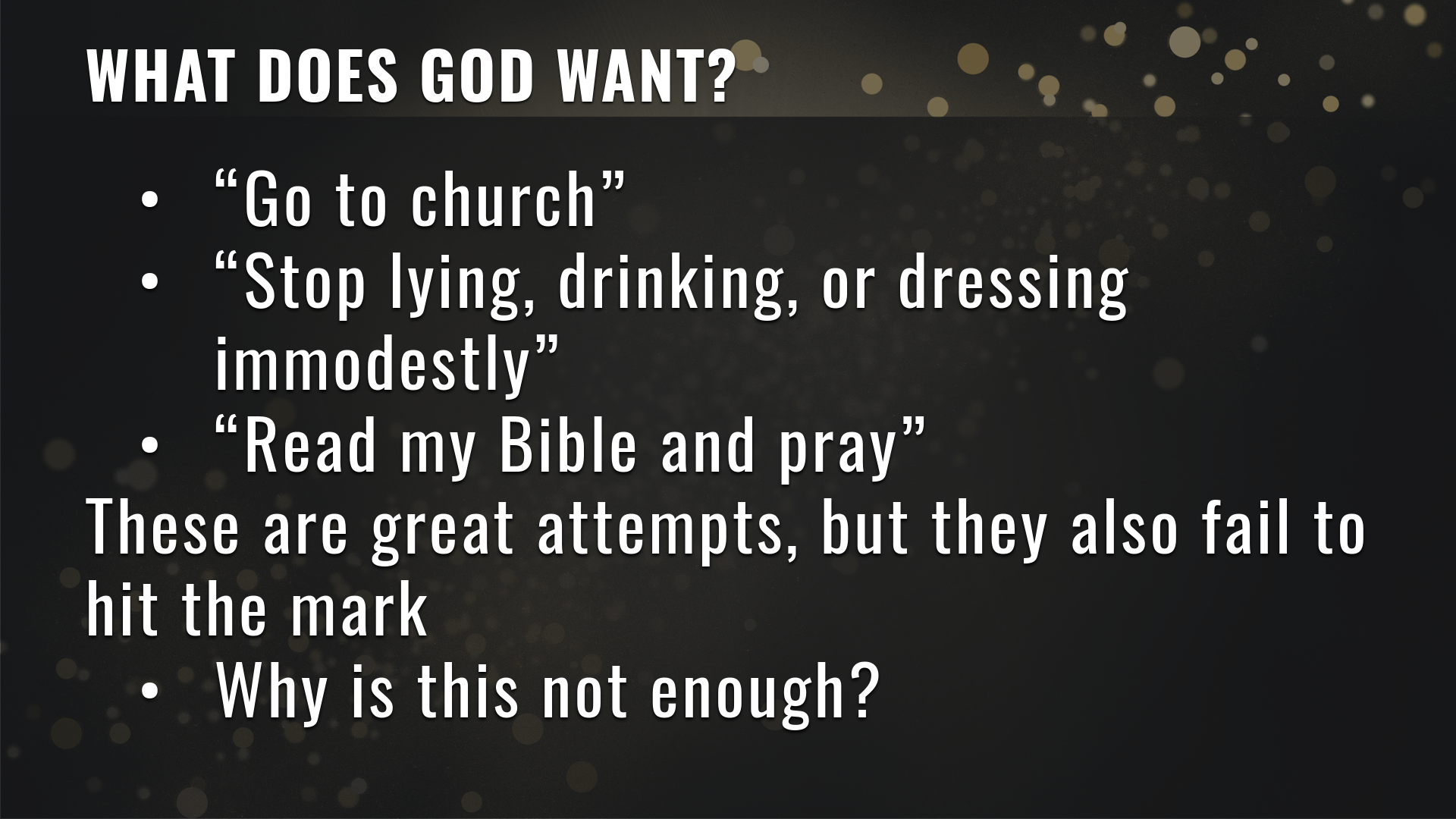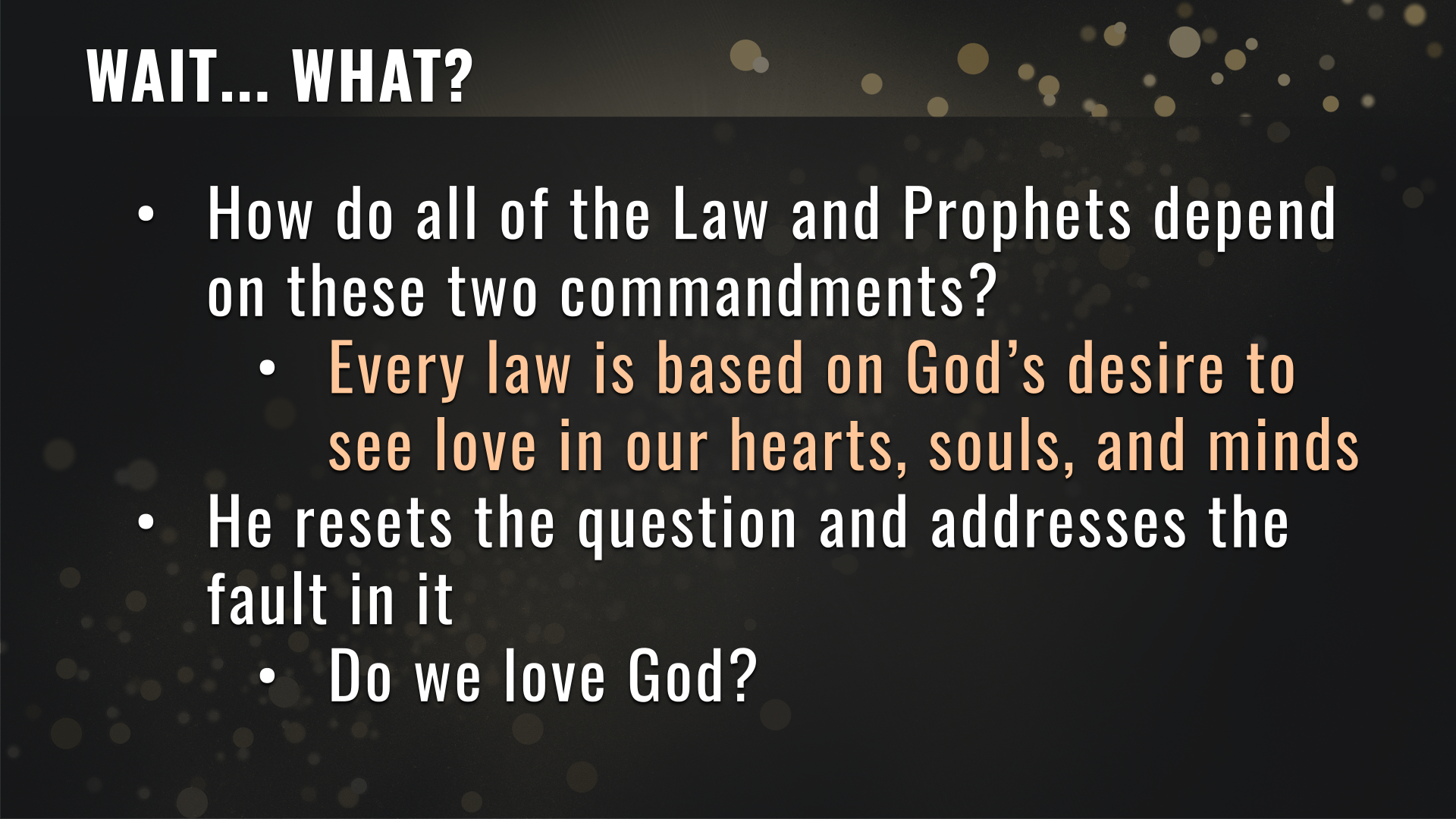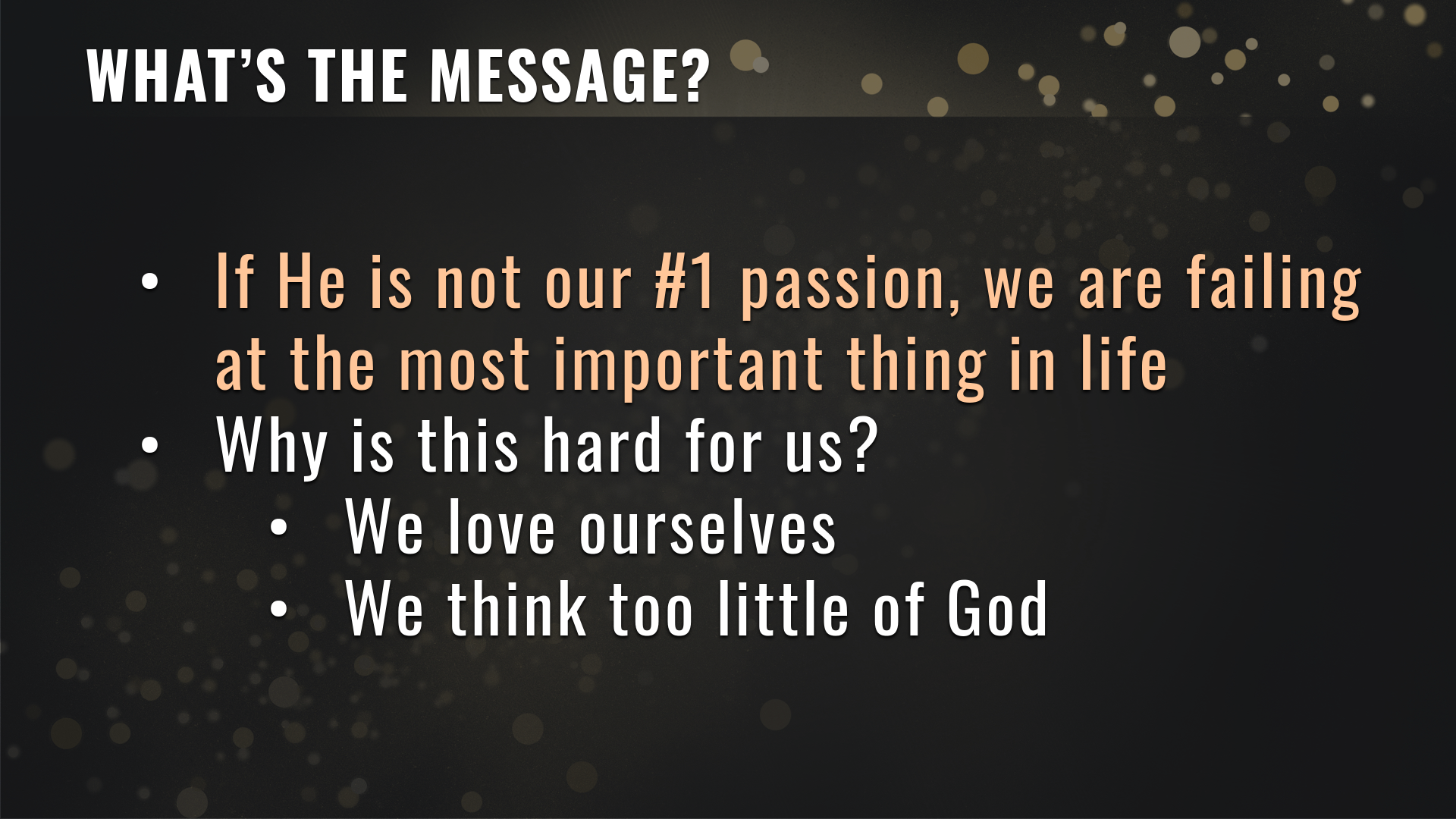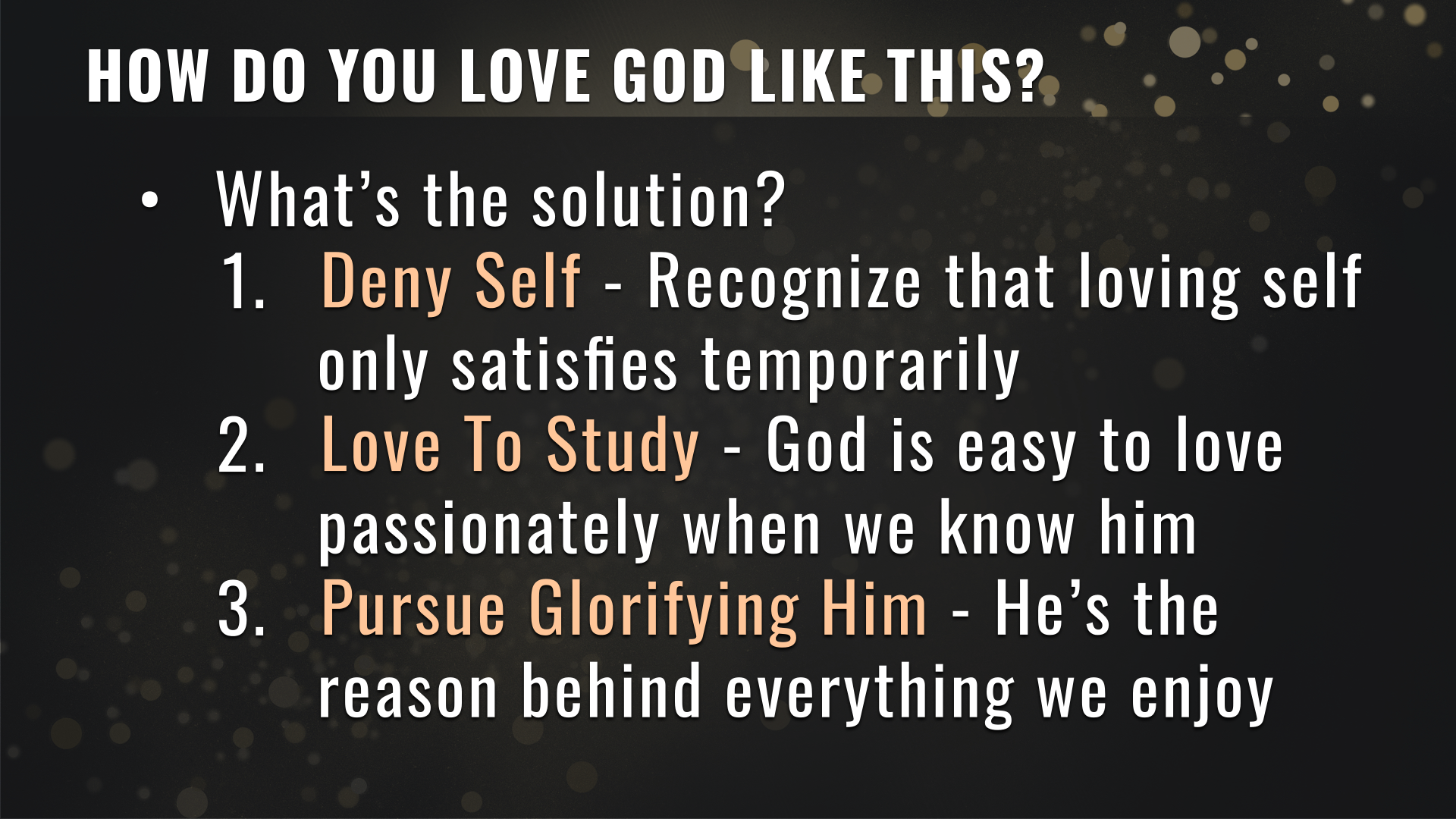Rule Number 1 (Matthew 22:34-40)
What does God want? Many different opinions exist. People who don't know what the Bible says would say, "God wants me to be a good person," "God wants me to be true to myself," "God wants me to love people," or "God wants me to enjoy the life he has given me." These aren't terrible answers for people who have no clue what the Bible says. But they aren't entirely correct.
People who believe in the Bible might have a similar set of answers. They might adjust their answers to say, "God wants me to go to church," "God wants me never to lie," "God wants me never to steal," "God wants me to read my Bible and pray," or "God wants me to be faithful to my family." Some might have a much longer and more detailed list of things to do or not do. I have heard people tell me, "God doesn't want us to use a pitch pipe," "God doesn't want us to drink alcohol," "God doesn't want us to wear shorts," "God wants us to say a certain prayer to Mary when we sin," or "God wants me to marry a person of the same color." People believe that God wants things that are all over the map!
Who Gets To Decide?
The study this morning will be coming out of Matthew 22:34-40. We are going to spend two weeks on this little passage. Let's read it to understand why.
Matthew 22:34--40 (ESV) --- 34 But when the Pharisees heard that he had silenced the Sadducees, they gathered together. 35 And one of them, a lawyer, asked him a question to test him. 36 “Teacher, which is the great commandment in the Law?” 37 And he said to him, “You shall love the Lord your God with all your heart and with all your soul and with all your mind. 38 This is the great and first commandment. 39 And a second is like it: You shall love your neighbor as yourself. 40 On these two commandments depend all the Law and the Prophets.”
Verse 34 refers to the previous passage. Matthew tells us that the Pharisees want another go at questioning Jesus. This points to a greater context. Jesus has been teaching people in Jerusalem a few days before he will be crucified. All of the religious leaders are upset at the things he says because they teach differently. So the religious leaders (Pharisees and Sadducees) bring him questions to defame him or reduce his influence over the people. The Pharisees brought people with authority to arrest Jesus and tried to get Jesus to speak out against the authorities. The Sadducees asked a very controversial question hoping to create a wedge between Jesus and people on one side of the debate on the resurrection. Jesus has passed all of these tests. Instead of encouraging rebellion, he encourages glorifying God. Instead of taking a side on the resurrection, he points out the truth for all to see.
Now, one of the Pharisees is a lawyer. That's not a lawyer like we have today. This would be a man who is an expert on Jewish law. He asks Jesus, "Which is the greatest commandment in the Law?" Think about this question for a second. Why ask which is the greatest? Is there any law that is greater than another? Well, we would certainly call the law against killing greater than the law against lying. The religious leaders would also think of some laws as more significant than others. The Pharisees were very law-focused. They made laws to prevent men from breaking laws. In one case, Jesus condemned them for valuing the law of giving God money more than they valued the law of giving their parents honor. We might say that sounds good. But they wanted to give God more money so they could appear righteous before men and used the money they owed their parents to do that.
So this question is at the core of the Jewish religion, and we often wonder which commandments God cares most about. We want to know which one we can break and find forgiveness versus the serious ones that make us worthy of death. Really, the goal is to reduce the law to something more manageable. There were 613 laws in the Old Testament. Can we reduce that down to a handful?
Many of the religious leaders tried to do that. They would focus on the laws about being clean or the laws about the Sabbath. This led them to believe that they were righteous by focusing on those particular laws. But the problem is that they all disagreed. Who gets to decide the correct list? Let's ask Jesus and get his opinion. Then, we will weigh it with everyone else's opinion and decide which condensed version of the law we like best. Whichever sounds the most righteous is what we will do.
Do we operate like this? Isn't this the way people choose which church to go to and what to believe? I'm sorry, but this all sounds kind of foolish to me. Let's see what Jesus says.
Two Commands
Jesus responds to them by telling them to love God with their hearts, souls, and minds and to love their neighbor as themselves. He does not tell them, "You shall not murder," or "Don't worship idols." He doesn't point to any specific command. He points to the more outstanding overarching commands which dictate how we view the specific details. I think it's essential to notice that Jesus does not reduce the law. He doesn't teach them to value one law over another. He teaches them to value all of the laws more than they ever have in the past.
If you have been going to church for very long at all, you probably know these commands. But we will look closely at them this week and next week to make sure we understand what is being said. If you miss next week, please try to review it on our website. These are the two greatest commandments according to Jesus. Notice what he says about them, "On these two commandments depend all the Law and the Prophets." Consider the weight of that statement. All of the Law and Prophets hang on these two commandments from God. Every word God speaks is about God wanting us to love him and love his neighbor. So, we need to look at it through that lens when we study the Old Testament. Every commandment is intended to teach us how to love God and how to love his neighbor.
Love God
Let's talk for a second about what it means for us to love God. If someone asked you, "Do you love God?" how would you respond? If you believe that there is a God, you might be bold enough to say, "Of course I love God." But if we were honest, we might say, "What does that mean? I'm not sure." If we were humble, we might say, "I have not loved God as I should, but I want to."
To the one who says, "Of course I love God." Is this a pride thing, or do you really love God? What does that mean to you? I remember when I was younger reading John 14:15
John 14:15 (ESV) --- 15 “If you love me, you will keep my commandments.
I would read that and think, "Loving God means keeping his commandments." But notice that the statement is cause and effect. "If you love me," is the cause, and "Keep my commandments" is the effect. One proceeds out of the other, and it's not like I wanted to read it. It does not say, "If you keep my commandments, you love me." We understand this on a deeper level in our marriages. How many of us would feel loved if our husbands or wives ran through a list of tasks as fast as they could before running off to do something else? Saying "I love you" doesn't necessarily mean that we love our spouse when it is part of a checklist. But this is the way so many people approach God. Look at what Jesus says in this text. The greatest commandment is to love God will all your heart, soul, and mind. Consider what that would look like!
What Would This Look Like?
The heart, soul, and mind represent the core of who we are. Everything inside of us must love God. This is a familiar figure of speech that is used to represent our passions and desires. To desire something with the core of who we are is to spend all of our time working on it and thinking about it. So many times, we desire empty things. We desire to be the favorite child, the best athlete, the most valuable employee, or the wealthiest person. But all of that is vanity. When we get it, we aren't satisfied. We are just left wanting more. God wants to be the desire of our hearts. He wants us to have a passion for him and his will. We tend to have a passion for things in this world, but God wants us to have a passion for him.
James 4:1--10 (ESV) --- 1 What causes quarrels and what causes fights among you? Is it not this, that your passions are at war within you? 2 You desire and do not have, so you murder. You covet and cannot obtain, so you fight and quarrel. You do not have, because you do not ask. 3 You ask and do not receive, because you ask wrongly, to spend it on your passions. 4 You adulterous people! Do you not know that friendship with the world is enmity with God? Therefore whoever wishes to be a friend of the world makes himself an enemy of God. 5 Or do you suppose it is to no purpose that the Scripture says, “He yearns jealously over the spirit that he has made to dwell in us”? 6 But he gives more grace. Therefore it says, “God opposes the proud but gives grace to the humble.” 7 Submit yourselves therefore to God. Resist the devil, and he will flee from you. 8 Draw near to God, and he will draw near to you. Cleanse your hands, you sinners, and purify your hearts, you double-minded. 9 Be wretched and mourn and weep. Let your laughter be turned to mourning and your joy to gloom. 10 Humble yourselves before the Lord, and he will exalt you.
James says that Christians are struggling because they have desires and passions that are not God. We are committing spiritual adultery in God's eyes. Please don't mistake these words for something they aren't. I'm not trying to speak in vague platitudes or say something that no one can live up to. Everyone must live in the world. There is nothing wrong with living in the world and enjoying wholesome things in this world. But there is a difference between enjoying golf and making it my passion. There is a difference between being interested in technology and making it my passion. The number one rule says that God must be our only passion. We must love him with all of our hearts, souls, and minds.
What's The Problem?
Why is this so hard for us? If we are honest with ourselves, we realize that there are times when we don't love God as we should. We love things of this world like we ought to love God. We pursue these things with everything inside of us. Why? Isn't the root of it all because we love ourselves with all of our hearts. That's why we do what we want to do instead of what God wants us to do. We do not pursue God with everything we have because we only want to pursue what benefits us. We don't put all of our thought and strength into pleasing him because we want to please ourselves. That's why we waste our minutes, hours, days, and weeks doing things that have nothing to do with God instead of devoting ourselves to his service. We think, "I don't have to go to Bible class." Or we think, "I don't have to come back tonight." No, you don't have to do that. You don't have to participate in the work Christians here are trying to do for God's glory. But if you understand what it means to love God with all your heart, soul, and mind, you will want to help this body grow more than you will want to help your bank account grow. You will want to be here more than you want to be on your couch, in your shop, or on the lake. In our society, we tend to get things out of balance. We work too much and sacrifice time worshipping God to at least have a little fun and enjoy the fruit of our labors. How about we work less, play less, and start to pursue a relationship with our God?
What's The Solution?
How do we get to where we aren't addicted to this world? Maybe church and the Bible seem boring to you. Maybe your heart is just too infatuated with the distractions of this world. The only way to develop a passion for God is through the study of his word. We must become like the Psalmist who said, "Oh how I love your law, it is my meditation all the day," or "More to be desired are they (God's words) than gold, even much find gold. Sweeter also than honey or the honeycomb." When we start to saturate ourselves with God's word, love for God is easy. We start to say, "Do I have to miss the Bible study?" We develop a deep, sincere longing to know God, meet God, and call him our Father. We love him with all of our hearts because of who he is, what he has done, and all he promises us. We don't come to know all of that without the word.
If you are struggling to get anything of value out of the word by yourself, let's study together, and I'll show you how awesome it really is. Technology makes it easy for us to connect and enjoy God's word together. Don't just let this opportunity pass you by.
Conclusion
When we stop to think about what God wants, we are drawn to the Bible. It is the inspired word of God. Without it, we would not know who God is or what he wants from us. We have seen that God doesn't want us to keep just a few commands. If we view a relationship with God in terms of rule-keeping, Jesus crushes our favorite rules and exalts the rules we despise the most. He wants us to love him with our hearts. As we study the Bible, we learn that God is nothing like we could imagine. He is much more loving and also much more dangerous than we tend to think. He is more loving than we tend to think because he is exceptionally patient toward law-breakers. He is more dangerous than we tend to believe because simply refusing to love him and choosing to love the world instead will result in punishment and destruction. He sent Jesus to save those who would see his love and respond with love. He works all things together for the good of those who love him. Has the sacrificial love that he has shown to us compelled us to have a passionate love for him? If that love is in you, it will motivate you to know more about God, and you will want to keep his law. Next week, we will talk about loving your neighbor.










